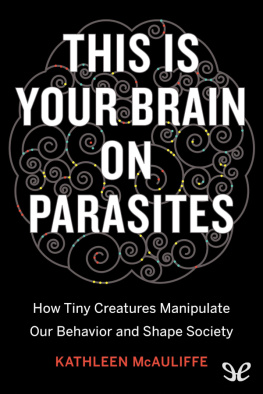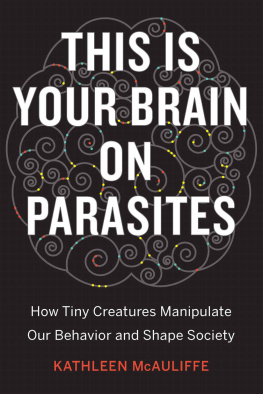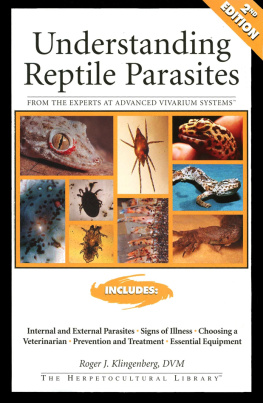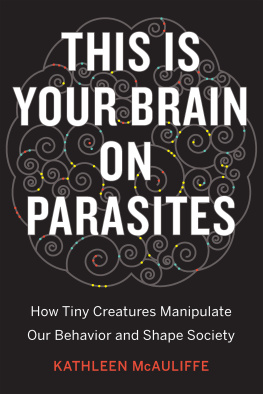Kathleen McAuliffe - This Is Your Brain on Parasites
Here you can read online Kathleen McAuliffe - This Is Your Brain on Parasites full text of the book (entire story) in english for free. Download pdf and epub, get meaning, cover and reviews about this ebook. year: 2016, publisher: ePubLibre, genre: Art. Description of the work, (preface) as well as reviews are available. Best literature library LitArk.com created for fans of good reading and offers a wide selection of genres:
Romance novel
Science fiction
Adventure
Detective
Science
History
Home and family
Prose
Art
Politics
Computer
Non-fiction
Religion
Business
Children
Humor
Choose a favorite category and find really read worthwhile books. Enjoy immersion in the world of imagination, feel the emotions of the characters or learn something new for yourself, make an fascinating discovery.
- Book:This Is Your Brain on Parasites
- Author:
- Publisher:ePubLibre
- Genre:
- Year:2016
- Rating:3 / 5
- Favourites:Add to favourites
- Your mark:
- 60
- 1
- 2
- 3
- 4
- 5
This Is Your Brain on Parasites: summary, description and annotation
We offer to read an annotation, description, summary or preface (depends on what the author of the book "This Is Your Brain on Parasites" wrote himself). If you haven't found the necessary information about the book — write in the comments, we will try to find it.
This Is Your Brain on Parasites — read online for free the complete book (whole text) full work
Below is the text of the book, divided by pages. System saving the place of the last page read, allows you to conveniently read the book "This Is Your Brain on Parasites" online for free, without having to search again every time where you left off. Put a bookmark, and you can go to the page where you finished reading at any time.
Font size:
Interval:
Bookmark:
This book might never have been completedat least not on schedulewere it not for my kind, energetic, and immensely capable husband, Joshua Cohn. Despite having a demanding career of his own, he critiqued my every draft, improving each versionand there were a lot of them. Did I mention that he mows the lawn and does all the shopping and cooking?
My children, Rachel and Daniel, went from teenagers to adults over the span of time I wrote this book. They were also supportive of the endeavor and never once complained about having a half-present mother who babbled incessantly about parasites.
My sister Gisele McAuliffe, whos much better organized than Ill ever be and a whiz with computers, offered sage counsel about working efficiently and was on call around the clock to solve IT problems. Both she and her husband, David Caleb, very kindly went through the manuscript from beginning to end with a fine-tooth comb, pointing out passages that struck the wrong note or needed more finessing.
I am also blessed with wonderful friends who were enthusiastic supporters of the project from the start. A few deserve special mention.
Phoebe Hoban, a best-selling author, educated me on the intricacies of the publishing industry from A to Z and was a constant reassurance whenever I hit a snag.
When, in a moment of panic, I thought Id never be able to come up with a satisfying conclusion to the book, a musician friend, Tim Devine, offered great ideas on the spur of the moment, even drafting some of them in scintillating prose that made me jealous of his facility as a writer. I was tempted to cut and paste, but thankfully inspiration did strike, albeit only a moment before the final, final deadline.
Wallace Ravven, a fellow science writer, helped me at the eleventh hour as well, drawing my attention to passages that he felt were not nuanced enoughand he was right. Based on his criticism, I made last-minute changes that I suspect may have spared me some bad reviews (or so I pray).
Im also indebted to my literary agent, Zo Pagnamenta, who always responded to my queries at lightning speed, read every draft of the manuscript seemingly overnight, and provided thoughtful feedback and guidance on every aspect of the book. (Much thanks to Bob Weil at Norton for steering me toward her.)
I was blessed to be assigned a copyeditor who is also a physician. Tracy Roe was not only attentive to every detail but also flagged difficult-to-follow passages and suggested additions to enhance the content.
My copyeditor thanked me profusely for putting the books references in the proper format, saving her many hours of work, but the credit actually goes to Lindsay Devine, whom I hired to do the job and who did it much better than I ever could.
My editor and publisher, Eamon Dolan, was a delight to work with in every way. He was cheerful, efficient, decisive, knew exactly what he wanted and articulated it well, and cured me of some bad writing habitsweak interrogative transitions and nice-sounding but hollow prose that he called sausage wrapping. For a long time, they were the bane of my existence, but Im ever so happy that they never made it into print. Thank you, Eamon!
There are many, many scientists who contributed to this book, so I cant possibly mention them all, but here is a list of some who were exceptionally generous with their time: Lene Aare, Shelley Adamo, Martin Blaser, Gerald Clore, Stephen Collins, John Cryan, Valerie Curtis, William Eberhard, Andrew Evans, Daniel Fessler, Corey Fincher, Jaroslav Flegr, Benjamin and Lynette Hart, Celia Holland, Patrick House, Michael Huffman, David Hughes, Clemens Walter Janssen, Kevin Lafferty, Frederic Libersat, Emeran Mayer, Glenn McConkey, Janice Moore, Charles Nunn, Michael Bang Petersen, David Pizarro, Teodor Postolache, Robert Poulin, Nicolas Rode, Paul Rozin, Robert Sapolsky, Mark Schaller, Gary Sherman, Frdric Thomas, Randy Thornhill, E. Fuller Torrey, Ajai Vyas, Michael Walsh, Joanne Webster, Geraldine Wright, Robert Yolken, and Sera Young.
New York Times science writer Carl Zimmer indirectly contributed to this work by penning Parasite Rex, a gem of a book published in 2003 that was my first introduction to parasitic manipulators and is a hard act to follow.
We like to think of ourselves as in the drivers seat, choosing where to go, whether to speed up or slow down, when to switch lanes. We make the decisions and bear the consequences. This is a convenient, even necessary belief. If we jettison the notion of free will, the laws that hold people accountable for their actions begin to crumble. The world becomes an unruly or even terrifying place. Alien beings that turn us into zombies, bloodthirsty vampires, and sex-crazed robots are standard sci-fi fare precisely because they evoke the horror of losing control or, worse, becoming slaves to creatures bent on exploiting us for their own gain. So its disconcerting to think that an invisible passenger might also have a hand on the steering wheel, vying to move us in one direction when wed rather go another. When we let up on the accelerator, an unseen foot presses harder.
Parasites are like that invisible passenger. Adept at outwitting our immune systems, they sneak aboard our bodies and then the devilry begins. They cause rashes, lesions, aches, and pain. They eat us from the inside out; use us to incubate their young; sap our energy; blind, poison, maim, and sometimes kill us. But thats not the full extent of their clout. Some parasites have another trick up their sleevesan awesome hidden power that astounds and confounds even scientists who study them for a living. Simply stated, these parasites are masters of mind control. Whether as tiny as a virus or as big as a six-foot-long tapeworm, they have found all kinds of devious methods to manipulate the behavior of their hosts, and that includes, many researchers now strongly suspect, humans.
The impetus for this book was a discovery on the Internet. Im a science journalist and one day while foraging for interesting topics to write about I stumbled across information about a single-celled parasite that targets the brains of rats. By tinkering with the rodents neural circuitsexactly how is still a matter of fervid studythe invader transforms the animals deep innate fear of cats into an attraction, thus luring it straight into the jaws of its chief predator. This is a felicitous outcome not only for the cat but also, I was stunned to learn, for the parasite. It turns out the feline gut is exactly where the organism needs to be to complete the next stage of its reproductive cycle.
This revelation got me thinking about my own cat, who was fond of dropping dead rodents at my feet. Horrified as I was by this habit, I could not help admiring her hunting prowess. Now I wondered if it was she who was so clever or the parasite.
As I continued reading, more surprising news greeted me: The microscopic organism is a common inhabitant of the human brain because cats can transmit it to us when we come in contact with their feces. Perhaps the parasite was meddling with our brains too, speculated a Stanford neuroscientist associated with the research. I contacted him to find out what he meant and was pointed in the direction of a biologist in Czechoslovakia. Hes a bit of a wild man, he warned me, but I think it would be worth your while to speak to him. I called Prague and over the span of an hour was told a tale as bizarre as any Ive heard in my profession. It occurred to me on several occasions that the person at the other end of the line might be a kook, but I pushed those thoughts aside and kept listening because it was impossible not to. Im a sucker for a great story and this one had all the elements of a first-rate medical thriller. It was by turns creepy, scary, weird, and inspiring. Whats more, if true, it had important health ramifications.
Font size:
Interval:
Bookmark:
Similar books «This Is Your Brain on Parasites»
Look at similar books to This Is Your Brain on Parasites. We have selected literature similar in name and meaning in the hope of providing readers with more options to find new, interesting, not yet read works.
Discussion, reviews of the book This Is Your Brain on Parasites and just readers' own opinions. Leave your comments, write what you think about the work, its meaning or the main characters. Specify what exactly you liked and what you didn't like, and why you think so.











